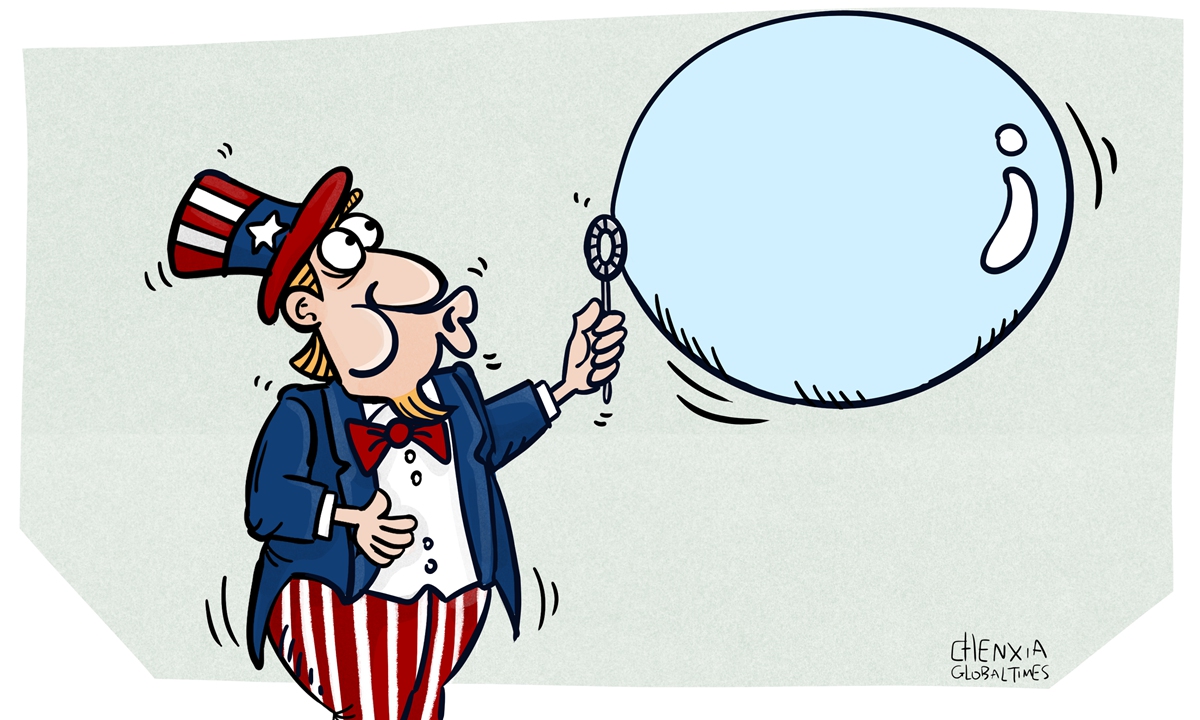COMMENTS / EXPERT ASSESSMENT
Will Biden’s fiscal largesse cause inflation and implode the bubble?

Illustration: Chen Xia/GT
The US Federal Reserve has promised it will probably not raise interest rates before 2023 to support recovery of the pandemic-ravaged US economy. However, prices of raw materials and manufactured commodities keep rising, causing inflation to raise its ugly head. It won't be long - the end of 2021 or start of 2022 - before the central bank is forced to take action by upending its too loose monetary policy.Wall Street investors are overly sensitive to any move by the Fed to raise rates and cut short its bonds-buying program, also known as quantitative easing. But in reality bubbles always burst, be they inflated housing prices or skyrocketing US stocks. In 2008, the world saw the burst of the US housing bubble that led to its financial system meltdown and subsequent global-level economic recession.
The largesse of US President Joe Biden's fiscal stimulus, or American Rescue Plan (ARP), is expected to open Pandora's Box. In essence, fiscal spending is inflationary, which is more so, coupled with the Federal Reserve's extraordinarily loose monetary policy, which was meted out to protect a nascent growth amid the coronavirus-induced crisis.
To make things worse, the Biden administration has largely adopted his predecessor Donald Trump's protectionist economic policies, including Trump's exorbitant tariffs imposed on hordes of Chinese imports, as well as his blanket export bans to oppress dozens of Chinese technology companies. The tariffs have generally elevated the prices of Chinese commodities in the US market, contributing to its inflationary pressure. The trade and technology war between the two economic superpowers has also impaired global supply chains, inflating prices of many commodities, such as auto-use microchips.
The Biden administration's first fiscal spending bill, at a price tag of US$1.9 trillion, easily sailed through the US Congress earlier this year. His second $2.2 trillion bill, including lavish spending on infrastructure, child care, education and technology research and development is mostly likely to be approved by Congress controlled by his fellow Democrats. And, Biden has more spending plans in his drawer.
Economists are fretting about the $4.1 trillion heavy fiscal spending which could risk stoking runaway inflation. Now American families have as much as $2 trillion in stashed cash, saved during a 14-month pandemic and the US federal government's generous dole-outs. In theory, inflation rises quickly due to fiscal injections into the economy, particularly stimulus checks.
The latest report from the US Labor Department showed the economy only generated 266,000 jobs in April, far short of expectations, but across-the-board compensation levels are elevating as wages paid by employers in the catering sector grew more than 4.6 percent in the month. The wage inflation comes along much earlier than in previous economic cycles, which might have already caused concern for the Federal Reserve.
A few days ago, Goldman Sachs, one of the US' largest investment banks, said in a report that its economists expect core consumer prices to surpass 2.4 percent for April, marking the steepest year-over-year increase since 2007. Some fear that the yearly rate of inflation could climb to 3.5 percent or even higher in 2021 - as compared to the 2 percent benchmark the Federal Reserve said it could tolerate.
On the broad marketplace, shortages of everything from semiconductor microchips to oil, lumber, copper, zinc and rare-earth minerals have disrupted market order, causing a surge in global demand and a spike in inflation. And, some Federal Reserve policymakers start to show concerns that costs for many goods and services will jump in the second half of 2021, a bitter pill for American consumers to swallow if dining, travel, entertaining and other service prices rebound from sharp declines in 2020.
Biden's $4.1 trillion economic spending agenda has drawn rising critique from American conservative economists and the Republicans. Even former US Treasury Secretary Larry Summers, who is a Democrat, has warned the heaving stimulus spending could lead to stagflation. And, Janet Yellen, Biden's Treasury Secretary, suggested a few days ago, that if inflation "becomes an issue", the Federal Reserve may respond by moderately raising interest rates as an instrumental "tool".
However, the tool might produce another unwanted consequence. If the Fed is forced to resort to monetary tightening to offset price hikes caused by Biden's fiscal expansion, the US needs to do all it can to avoid nipping off economic and job growth, as well as an economic recession, which will prove to be particularly painful for tens of millions of middle class and impoverished Americans, for they have just been whipsawed by the coronavirus pandemic.
Also, a recession in 2022 won't augur well for Biden, as he faces the mid-term elections. Now, there are voices in Biden's Democrat bastion calling for him to put brakes on his spending largesse, otherwise many Democrats are likely to encounter a mid-term election backlash. A loss of Democrat majority control in either chambers of US Congress will severely stymie Biden's presidential power in the second half of his tenure.
"As people return to their normal lives ... there could be quite exuberant spending and we could see upward pressure on prices," Federal Reserve Chairman Jerome Powell said in January. "The real question is how large is that effect going to be and will it be persistent?" Powell said.
Perhaps Powell himself has reservations about Biden's huge spending bills, but he keeps mum. A growing number of economists and organizations in the US have spoken out that Biden's economic policies are misguided, feared to become a spark for a surge in inflation. And, the clobbering of his policies on the middle class will come in many ways - tax increases, higher corporate regulation, and steady price hikes threatening to implode the big Wall Street bubble.
The author is an editor with the Global Times. bizopinion@globaltimes.com.cn
